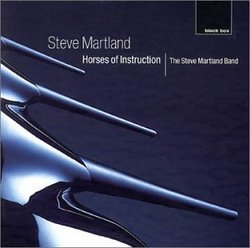| All Artists: Steve Martland Title: Horses of Instruction Members Wishing: 0 Total Copies: 0 Label: Black Box Classics Original Release Date: 1/1/2002 Re-Release Date: 1/8/2002 Album Type: Enhanced Genre: Classical Styles: Chamber Music, Historical Periods, Classical (c.1770-1830) Number of Discs: 1 SwapaCD Credits: 1 UPC: 680125103321 |
Search - Steve Martland :: Horses of Instruction
CD Details |
CD ReviewsRhythmically elaborate but essentially cross-over dance musi Discophage | France | 12/31/2006 (3 out of 5 stars) "I discovered the music of Steve Martland through the Factory CD containing his two pieces "Babi Yar" for symphony orchestra and "Drill" for two pianos - and enjoyed it very much: very loud, not very subtle, but very exciting (as I titled my review of the disc, to which I refer you: Steve Martland: Babi Yar/Drill) in its hammering and hocketing racket.
I wasn't so taken with some of the subsequent discs of Martland, and especially "Patrol", which contains music veering a little to much for my taste in the direction and imitation of Steve Reich - and the same applies to the present one. As he explains in the very informative booklet notes, Martland moved away from writing for the large symphony orchestra, as he finds "nothing more alienating than writing music for a symphony orchestra where no one knows who you are, what you do, or what you are trying to do" and as he wanted to "write some music that would be portable and also would avoid the classical concert world of bourgeois music-making and consumption". To that aim, he concentrated instead on writing for his own ensemble, the Steve Martland band, a group of 11 players mixing a rock rhythm section of bass and acoustic/electric guitar plus drums, a jazz brass ensemble of 3 saxophones, trumpet and trombone, and the "classical" piano, violin and marimba. Indeed, all the 9 pieces on this disc were either written or re-written (as in the case of "Horses of Instruction", "Mr Anderson's Pavane", "Principia" and "Re-mix") for the ensemble. They are short pieces: the longest, "Eternal Delight", lasts less than 14 minutes, and the shortest, "Thistle of Scotland" is under 3 minutes. They were composed between 1986 ("Re-mix") and 1998 ("Terminal") and 7 out of the 9 pieces comprising this disc are recorded for the first time ("Principia" and "Re-mix" were part of the "Crossing the Border" disc, and "Principia" was again on "Patrol"). So much for the hard facts. As for my opinion, the music Martland now writes strikes me as a rhythmically elaborate perhaps but essentially cross-over dance music. "Horses of Instruction" (named after a verse from William Blake's poem "The Marriage of Heaven and Hell": "the tigers of wrath are wiser than the horses of instruction") is a sectional work of strongly hocketing accents, "Kick" a series of variation on an 17th Century English folk tune, played on violin, sounding very Celt-like, "Re-mix" is a funny and demented take off from Marin Marais' "Sonnerie de Sainte Geneviève du Mont de Paris", and even "Mr Anderson's Pavane", a slow-moving dirge written in memory of the British film director Lindsay Anderson, is not by coincidence called a "Pavane", the slow dance for of the Renaissance. "Energy is Eternal Delight", another William Blake verse giving its title to one of the pieces on this disc, is an apt summary of Martland's credo, or again "Rock meets Reich", as his music has been dubbed, and it is a good caption. The influence of Louis Andriessen, Martland's Dutch teacher and repetitive composer, can be felt. I find it fun, agreeable, exciting, but a little too much "easy-listening" to be entirely nourishing. Despite what Martland says, it IS music for quick consumption - and I don't know that the clubs and venues where it might be played would be frequented exclusively by the working class, and not by the mid-30s to mid-40s bourgeois generation. But listeners with a taste for house-music, dance music, John Adams and Steve Reich might derive more enduring pleasures than myself from the music of Martland. " |

